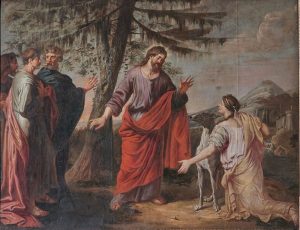
https://en.wikipedia.org/wiki/Exorcism_of_the_Syrophoenician_woman%27s_daughter#/media/File:Michael_Angelo_Immenraet_-_Jesus_and_the_Woman_of_Canaan.jpg
Mid-week Reflection (Matthew 15:21-28) [5th August 2020]
In his book, Incarnational Mission: Being with the World, Samuel Wells, tells the story of Charles, a gynaecologist from Senegal. He was trained in Dakar, Paris and London. He was a successful man with high reputation. He loved to work for the people of his country. But because he chose to fight for the rights of the excluded, his life was in danger and he had to leave his country. He chose to come to the UK and thought that, being a doctor with a solid background, he would find support. But he was so disappointed that he was almost determined to commit suicide. He used to walk in the country side. In one of his walks, while crossing a farm land, he noticed that a sheep was breathing extremely hard. He leaned over her and realized she was just giving birth, but the lamb was not in a normal position. He patiently managed to reposition the lamb, which was born healthy, and the life of the sheep was saved. As he struggled to help the sheep, the farmer and a few people gathered around him, who, when they saw that everything went well, began to clap in admiration and gratitude. The farmer asked him: “Are you a vet?”. “No”, he said. And he continued: “I am a doctor, but in this country I’m not allowed to work with human beings”. And then he left to continue his walk. After a few moments, the farmer called him back: “We need people like you”.
In the Gospel according to Matthew, chapter 15, verses 21 to 28, we can read the story of the Canaanite woman asking Jesus to free her daughter by the demon. Jesus’ answer, at first reading, seems extremely strange. It sounds like a refusal, for the simple fact that she is not part of the nation of Israel. But, in reality, it is not so. Let’s do a memory exercise.
We know who the people of Israel were, how God chose them to be His people, how they was called to be a sign of His power, to be witnesses of the true God among the nations of the earth. We know just as well how many times Israel has strayed from its call for this mission. Each time, God sent messengers to remind him of his identity: a witness to God’s love for people.
Jesus came for the same reason, to recover the lost sheep of Israel, to make him a witness of the same love. Again. God is faithful to his promise. He never tires of calling the people of Israel to witness his love, loving them unceasingly. For this, the people of Israel need faith: to believe in God’s promise and to believe in his mission. That’s exactly what the Canaanite woman has. She believes in the love of God that can heal and that is why she becomes a witness to this love: her daughter has been healed.
“Woman, great is your faith”, declares Jesus. This can also be translated as “I need people like you. I need witnesses like you”.
It is true that priority in our concerns have those in our family, those in our community, those of the same language as us. But this does not mean that those different from us cannot be as good as we are, as useful for our good. They are a gift we just have to discover. This is exactly what the farmer says in the story above: We need people like them. But let’s not forget that they also need people like us, in order to be able to help us, to enrich us. That means being a witness. That means being with. This is our vocation as a Christian community. We need people like them, they need people like us.
It is a call not to consider the different one from us as someone who takes what we deserve, but as one who can offer. For this we must accept to be with him and understand that no one is so rich that he lacks nothing and no one is so poor that he has nothing to offer.
(Revd. Bernard Noghiu, Southend on Sea, 4th August 2020)
